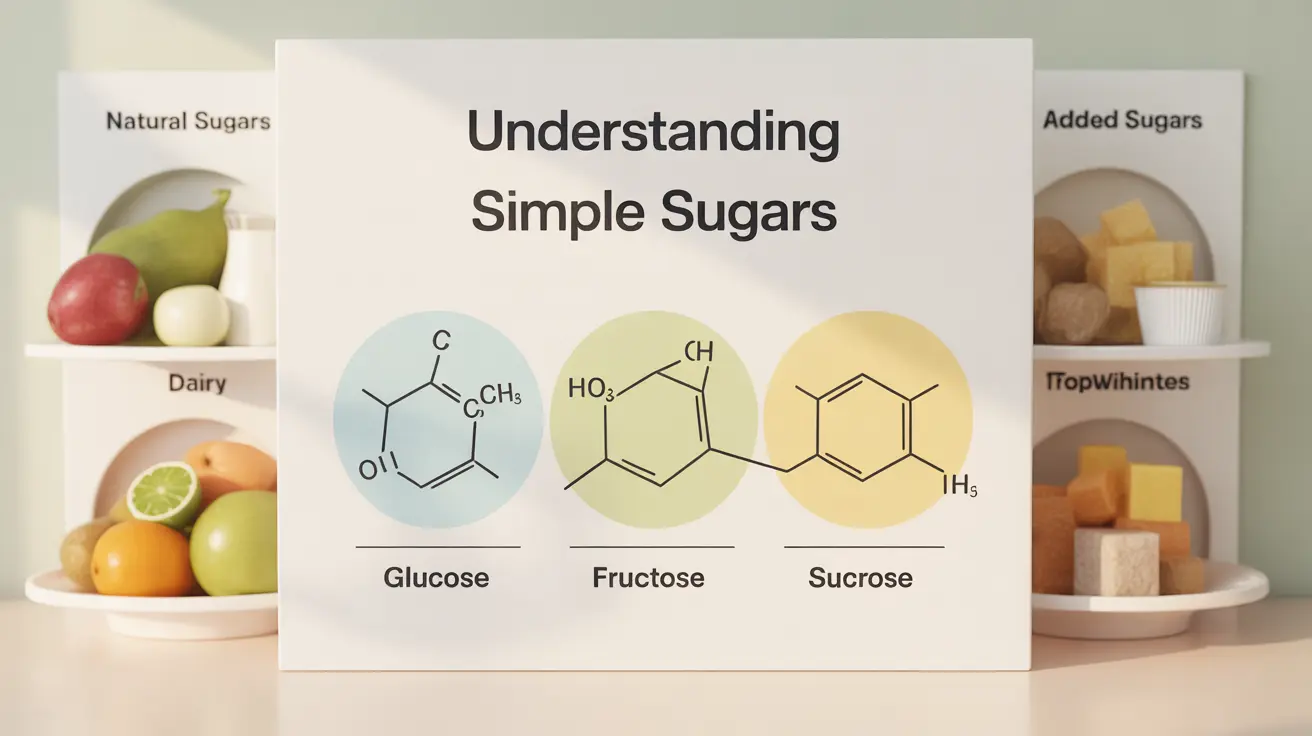Simple sugars, also known as simple carbohydrates, are fundamental components of our diet that play a crucial role in how our bodies obtain and use energy. These basic molecular structures are essential to understand, especially when making informed decisions about nutrition and health.
In this comprehensive guide, we'll explore what simple sugars are, their sources, effects on the body, and how to maintain a balanced approach to sugar consumption in your diet.
What Are Simple Sugars?
Simple sugars, or monosaccharides and disaccharides, are the most basic forms of carbohydrates. Unlike their complex counterparts, these molecules have a straightforward structure that allows for quick breakdown and absorption in the digestive system.
Types of Simple Sugars
The main types of simple sugars include:
- Glucose: The body's primary energy source
- Fructose: Naturally found in fruits and honey
- Galactose: Present in dairy products
- Sucrose: Table sugar (combination of glucose and fructose)
- Lactose: Milk sugar (combination of glucose and galactose)
- Maltose: Found in malted grains (combination of two glucose molecules)
Natural vs. Added Simple Sugars
Simple sugars occur naturally in many wholesome foods, but they're also frequently added to processed products. Understanding this distinction is crucial for maintaining a healthy diet.
Natural Sources of Simple Sugars
These foods contain naturally occurring simple sugars along with beneficial nutrients:
- Fresh fruits
- Vegetables
- Dairy products
- Honey
- Pure maple syrup
Common Sources of Added Sugars
Many processed foods contain added simple sugars, often in concerning amounts:
- Soft drinks and sweetened beverages
- Candy and confectionery
- Baked goods
- Breakfast cereals
- Flavored yogurts
- Condiments and sauces
Impact on Health and Body Function
Simple sugars significantly affect various aspects of health and bodily functions. Their rapid absorption can lead to quick energy spikes followed by crashes, influencing both short-term performance and long-term health.
Blood Sugar Response
When consumed, simple sugars cause a rapid rise in blood glucose levels, triggering insulin release. This quick response can affect energy levels, mood, and hunger patterns throughout the day.
Health Considerations
Excessive consumption of simple sugars, especially added sugars, may contribute to several health concerns:
- Weight gain and obesity
- Type 2 diabetes risk
- Dental problems
- Cardiovascular issues
- Inflammation
- Mood fluctuations
Balancing Simple Sugars in Your Diet
Creating a balanced approach to sugar consumption involves making informed choices about both natural and added sugars while emphasizing complex carbohydrates for sustained energy.
Healthy Sugar Management Strategies
Consider these practical tips for managing simple sugar intake:
- Choose whole fruits over fruit juices
- Read nutrition labels carefully
- Cook meals at home to control added sugars
- Select unsweetened versions of products
- Incorporate more complex carbohydrates from whole grains
- Pay attention to portion sizes
Frequently Asked Questions
What are simple sugars and how do they differ from complex carbohydrates?
Simple sugars are basic carbohydrate molecules that contain one or two sugar units, while complex carbohydrates contain three or more units linked together. Simple sugars digest quickly, causing rapid blood sugar changes, whereas complex carbohydrates provide sustained energy through slower digestion.
What foods naturally contain simple sugars and which processed foods often have added simple sugars?
Natural sources include fruits, vegetables, and dairy products. Processed foods commonly containing added simple sugars include sodas, candies, baked goods, and many breakfast cereals. The natural sources typically provide additional nutrients, while processed foods often contain "empty calories."
How do simple sugars affect blood sugar levels and energy in the body?
Simple sugars are quickly absorbed into the bloodstream, causing rapid spikes in blood sugar and insulin levels. This can lead to initial energy bursts followed by crashes, potentially affecting mood, concentration, and hunger levels.
What are the health risks of consuming too much added simple sugar?
Excessive simple sugar consumption can lead to weight gain, increased risk of type 2 diabetes, dental problems, cardiovascular issues, and chronic inflammation. It may also contribute to mood disorders and energy level fluctuations.
How can I balance simple sugar intake with complex carbohydrates for a healthier diet?
Focus on whole grains, legumes, and vegetables for complex carbohydrates while limiting processed foods with added sugars. Choose natural sources of simple sugars like whole fruits, and pay attention to portion sizes. Read nutrition labels and cook more meals at home to better control sugar intake.




